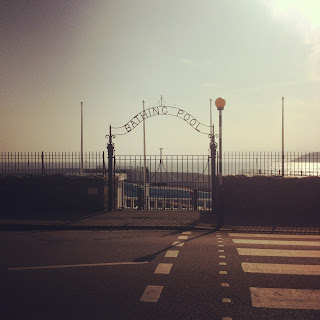Below is an extract about Parliament Hill Lido by
Caitlin Davies from her book 'Taking The Waters, A Swim Around Hampstead Heath'. Published by
Frances Lincoln. Photographs by
Ruth Corney. Photos are copyright and may not be reproduced without the permission of Ruth
Corney .
www.ruthcorney.com You can buy the book
HERE
 |
| Photo by Ruth Corney |
The
Parliament Hill Lido – also known as the Gospel Oak Lido – was
built during the golden age of lido construction, as part of a
government drive to improve the nation’s health, and especially
that of the working class. The aim was to produce a fitter nation
with a far better ‘National Physique’ – and what better than to
build outdoor pools?
Between
1930–39, at least 180 lidos were built in Britain, adding to the
fifty built the decade before. And it was the London County Council
that led the way. ‘I promised the people of London that the new LCC
would make London a “City of Lidos”. Here we are,’ announced
Herbert Morrison in the summer of 1937.
The
LCC then submitted proposals for a chain of five open-air swimming
pools, with the Parliament Hill Lido situated on 2.5 acres of land
once known as the Salisbury Plain. It was designed by two LCC
architects, Harry Rowbotham and T.L. Smithson, who designed all
thirteen of the LCC’s lidos built between 1906 and 1939.
The
press kept people fully informed about construction plans. Readers
were repeatedly told the size of the pool – 200ft by 90ft – and
its capacity, 650,000 gallons of water. There would be separate
swimming hours for men and women and, most daringly, set hours for
mixed swimming as well.
The
pool would be open every day during the summer, when for five days a
week men and boys could swim for free in the early mornings. On the
remaining two days it was the turn of girls and women. The lido would
also open for mixed bathing from 10 a.m. to closing time on four days
a week and bank holidays, at a charge of sixpence.
The
raised terrace around the pool was built as if for people to watch a
performance, and on opening day on Saturday 20 August 1938 there was
quite a show. Five hundred people packed the poolside as the
Secretary of the Football Association, Stanley Rous, gave the opening
address. He seemed a little confused as to why he’d been invited,
saying he could see no connection between football and swimming, but
‘a great deal of money has been spent here and I for one feel that
if 34,000 people learn to swim here in the next few years, it will
have been money well spent.’
This
was followed by a roll of drums by the Metropolitan Police Central
Band and then a graceful double dive by Flying Officer C.D. Tomalin
of the Highgate Diving Club and Miss J. Dixon of the Mermaid Swimming
Club. The diving display also included ‘an hilarious mock life
saving episode,’ according to the Ham
& High.
The
Mayor of St Pancras thanked the aquatic generosity of the LCC, while
an LCC representative said it was about time the very poor had access
to the sort of facilities normally only available to the very rich.
The
ceremony over, the crowds waiting outside were finally allowed to
enter; the doors opened and in they trooped cheering. No mention is
made of any lifeguards in the press reports, and the lido was
probably run by a park keeper; a white-coated individual who dealt
with the machinery and who was unlikely to have known how to swim.
But two ‘Keep-Fit’ instructors were present on certain days, with
free ‘advice and hints’ on swimming, diving and life saving.
Yet
while the lido opened with great fanfare, World War II was already on
the horizon. The press had announced air raid precautions, the first
million civilian volunteers had enrolled, shelters were being erected
and plans made for the possible evacuation of children. Even before
the lido opened, people were filling sand bags from the construction
debris. ‘They had dug up where the pool would be,’ remembers Paul
Thorogood, ‘and extracted soil to dig a hole, and there was a great
heap of it near the railway line. People filled bags with sand or
whatever it was. I was about seven years old and someone chucked a
brick at me and I still have the scar today.’
During
the long hot summer of 1939, London lidos still swarmed with life.
But when war was declared in September, one by one the nation’s
lidos began to close. The Parliament Hill Lido took a direct hit
during the Blitz when, on 13 September 1940, incendiary bombs caused
seventeen local fires. The last fell on the lido at 10.13 p.m., but
the fire brigade managed to extinguish each blaze within twenty
minutes, and the lido remained open.
This
was much to the relief of local children. ‘In the summer of 1943 I
visited the lido most days,’ recalls Roy Naisbitt, ‘I was
thirteen and I remember how lively it was, full of children and
families. I don’t remember people ever swimming up and down or
across the pool, just a mass of people going in all directions,
splashing around and enjoying themselves.’
When
war ended in 1945, life remained hard for most people, the country
was poor and food and clothes were still rationed. Few households had
televisions or cars, and lidos became urban resorts for post-war
babies. Leeroy Murray remembers his first visit to the Parliament
Hill Lido in 1948 when he was three years old. ‘I sat down at the
shallow end and I looked at the vast body of water that seemed to go
on forever, it was a whole world. And then gingerly I got in.’
 |
| Photo by Ruth Corney |
 |
| Photo by Ruth Corney |
 |
| Photo by Ruth Corney |






































